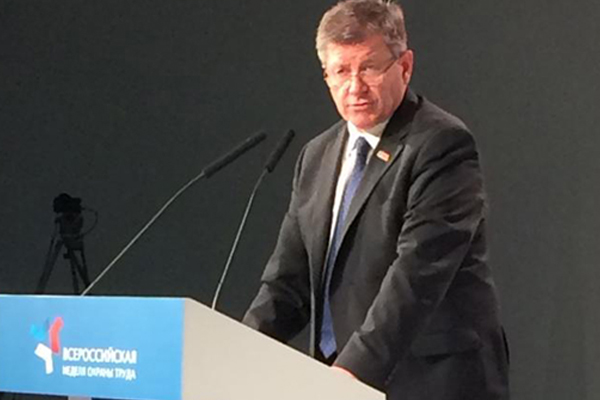|
Guy Ryder: ‘All Countries Should Ratify Health And Safety Conventions’
ILO Director-General, Guy Ryder, has called on all countries to ratify Occupational Safety and Health Conventions – an issue he described as being at ‘the heart of the ILO from the outset’. Addressing the strategic plenary session of the ‘All-Russia Occupational Safety and Health Week ’ in the Russian town of Sochi, Ryder told delegates that every year almost 3 million workers die from occupational accidents and work-related diseases, and 374 million suffer non-fatal accidents. This, he said, was ‘an unacceptable human cost’.
A focus on occupational safety and health (OSH) ‘is no less necessary today than in 1882 or 1919,' he stressed.
The ILO Director-General referred to the findings of the ILO report Safety and Health at the heart of the Future of Work , which was launched on 18 April.
The report warns of new risks that are emerging from digitalization and technologies such as artificial intelligence, bio- and nanotechnologies and draws attention to mental health, in particular psychosocial risks triggered by stress, and the emergence of non-communicable diseases.
“It’s not only working conditions that have changed over time, it’s the nature of health and safety hazards as well,” said Ryder. “And this will continue in the future. With all the transformative technological, demographic and environmental changes shaping a new world of work, it becomes more important than ever to anticipate new and emerging health and safety risks.”
“All these challenges have to be addressed with effective prevention strategies. Reinforcing the role of governments and social partners is essential in this regard,” he added.
Ryder told delegates that nearly half of ILO instruments relate directly or indirectly to OSH issues, and more than 40 standards specifically deal with occupational safety and health, and they are accompanied by over 40 Codes of Practice. These instruments have evolved over time from a very narrow approach to specific workplace risks to one that is focused on prevention.
He thanked the Russian Federation for ratifying at the end of last year, Convention 167 on the construction sector , which covers some of the most pervasive occupational hazards in the region.
Referring to the report of the Global Commission on the Future of Work , published in January 2019, Ryder reiterated the need for a ‘human-centred’ approach to work that puts people at the heart of policy-making. He also stressed that occupational safety and health are critical to the achievement of the UN 2030 Agenda for Sustainable Development , particularly SDG 3 on ensuring healthy lives and well-being for all, and SDG 8 on decent work and sustainable and inclusive economic growth.
|



